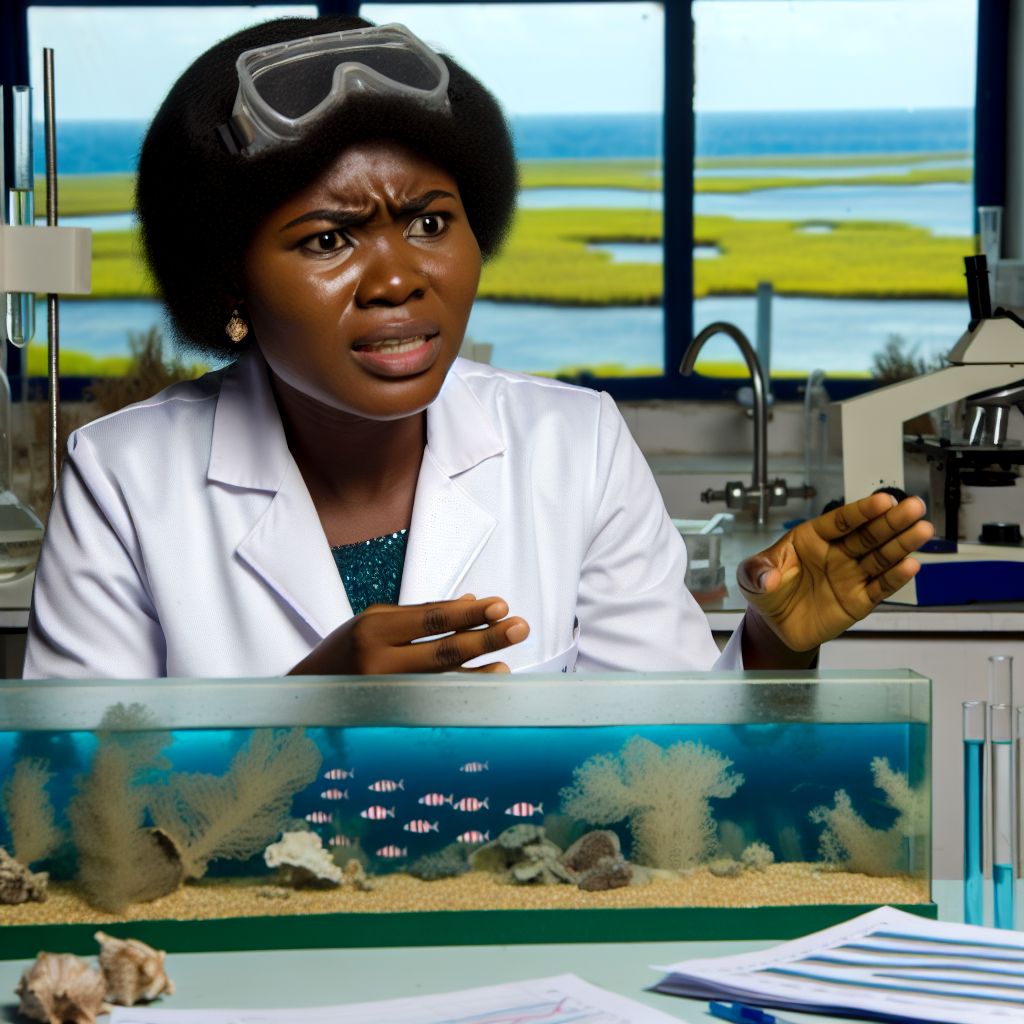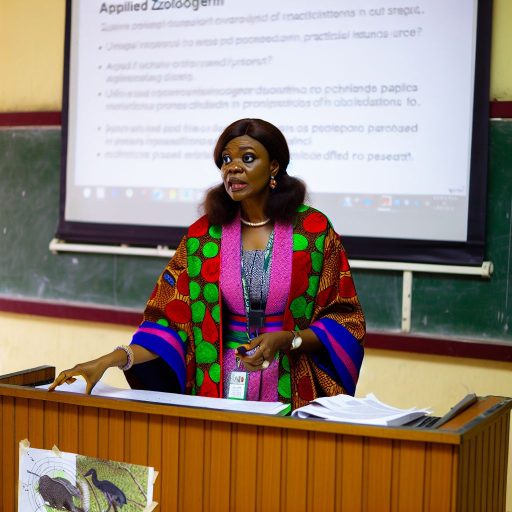Introduction:
Marine biology is the study of marine organisms and their interactions with the environment.
In Nigeria, coastal pollution has become a significant concern due to human activities.
The coastal areas of Nigeria are facing pollution issues caused by various sources such as oil spills, industrial effluents, and plastic waste.
These pollutants negatively impact marine life, ecosystems, and the livelihoods of coastal communities.
The consequences of coastal pollution are far-reaching and require urgent attention.
Marine biology plays a crucial role in Nigeria due to its vast coastline and rich marine ecosystems.
Highlighting the significance of marine ecosystems:
- Marine ecosystems provide food and resources for coastal communities.
- They contribute to the regulation of climate and weather patterns.
- They support biodiversity and enhance resilience to environmental changes.
- Marine ecosystems offer recreational opportunities and tourism potential.
- They are vital for sustaining fisheries, aquaculture, and marine-based industries.
Emphasizing the role of marine biodiversity in sustaining livelihoods:
- Marine biodiversity supports traditional livelihoods like fishing and artisanal activities.
- It provides jobs and income for coastal communities and contributes to poverty alleviation.
- Marine biodiversity offers genetic resources for biotechnological and medical research.
- It plays a critical role in ecosystem services such as nutrient cycling and waste treatment.
- Conservation of marine biodiversity is essential for sustainable development and human well-being.
Marine biology in Nigeria is indispensable for environmental, social, and economic reasons.
Protecting and conserving marine ecosystems and biodiversity is crucial for the long-term sustainability of coastal communities and national development.
Common pollutants affecting Nigerian coastal areas:
- Oil spills from offshore drilling activities
- Industrial waste runoff from factories
- Plastic pollution from improper waste management
Impact of Oil Spills on Nigerian Coastal Areas
Oil spills from offshore drilling activities are a major threat to the marine life in Nigerian coastal areas.
These spills not only harm the marine organisms directly but also affect the entire ecosystem.
The oil coats the feathers of birds, blocks the breathing pores of fish, and disrupts the food chain.
The toxic chemicals present in the oil can lead to the death of many marine organisms, causing a ripple effect on the entire ecosystem.
The coastal vegetation is also affected, leading to further consequences for the land and sea animals.
The economic impact of oil spills is substantial, as it affects fishing and tourism industries, which are significant sources of income for the local communities.
Industrial Waste Runoff
Industrial waste runoff from factories is another major source of pollution in Nigerian coastal areas.
These wastes contain a variety of toxic chemicals and heavy metals that can have detrimental effects on marine life.
The runoff can introduce pollutants such as mercury, lead, and arsenic into the water, posing serious health risks to marine organisms and humans who consume seafood from these areas.
The accumulation of these pollutants in the food chain can lead to bioaccumulation, where the concentration of toxic substances increases as it moves up the food chain.
This can have long-term consequences on the health of both marine life and humans.
Plastic Pollution
Plastic pollution is a growing concern in Nigerian coastal areas due to improper waste management practices.
The excessive use of single-use plastics and the lack of recycling facilities have led to a significant amount of plastic waste ending up in the ocean.
This plastic pollution poses a serious threat to marine life, as animals can ingest or become entangled in plastic debris.
The breakdown of plastic waste in the ocean releases harmful chemicals into the water, further contaminating the marine environment.
Microplastics, tiny plastic particles, have been found in the digestive tracts of marine organisms, affecting their health and well-being.
Efforts to Address Coastal Pollution Issues
To combat the pollution of Nigerian coastal areas, various strategies and measures are being implemented.
Collaboration between government agencies, industries, and local communities is crucial to address the root causes of pollution.
Strict regulations and enforcement of environmental laws are necessary to prevent further degradation of the marine environment.
Public awareness campaigns and education programs can help raise awareness about the impacts of pollution and promote sustainable practices.
Additionally, the development of innovative technologies for waste management and pollution control can play a significant role in reducing pollution levels in Nigerian coastal areas.
Overall, a concerted effort is needed to protect the fragile ecosystem of the Nigerian coast and ensure the health and well-being of marine life for future generations.
Delve into the Subject: Microbiology Lab Safety Protocols in Nigeria
Impact of coastal pollution on marine life:
Coastal pollution can lead to the disruption of marine food chains.
This affects the balance of ecosystems.
Pollutants in coastal areas can destroy habitats for marine species.
This leads to a decline in biodiversity.
The pollution in coastal waters can increase mortality rates among marine animals.
This threatens their populations.
Effects on marine food chains:
Coastal pollution can introduce harmful substances into the food chain.
This affects the health of marine organisms.
As pollution disrupts marine food chains, it can lead to a decrease in fish populations.
Transform Your Career with Expert Guidance
Get personalized mentorship consulting that’s tailored to your unique path. Our expert advice is actionable and exclusive.
Get StartedThis impacts fishing industries.
The disruption of food chains due to pollution can create imbalances in marine ecosystems.
This affects their overall health.
Impacts on habitats for marine species:
Pollution in coastal areas can harm coral reefs.
Coral reefs serve as vital habitats for diverse marine species.
Seagrass beds are crucial habitats for many marine species.
Pollution can lead to their destruction.
Mangrove forests provide habitats for various marine species.
However, pollution can cause their decline.
This endangers those species.
Consequences on mortality rates among marine animals:
Pollutants in coastal waters can expose marine animals to harmful chemicals.
This leads to increased mortality rates.
Pollution can impact the reproductive success of marine animals.
This results in lower population numbers and higher mortality rates.
Continuous exposure to pollutants can weaken the immune systems of marine animals.
This makes them more susceptible to diseases and death.
Explore Further: Impact of Animal Biology on Nigerian Ecosystems
Effects of Coastal Pollution on Human Health:
Contamination of seafood consumed by locals.
Exposure to harmful chemicals from polluted waters.
Health risks associated with consuming contaminated marine products.
Coastal pollution in Nigeria has serious implications for human health.
One of the primary concerns is the contamination of seafood that is consumed by locals living along the coast.
With increasing levels of pollution in the coastal waters, marine organisms such as fish, crabs, and shellfish are exposed to toxic chemicals and heavy metals that accumulate in their tissues.
When these contaminated seafood are consumed by humans, it can lead to various health issues.
Exposure to harmful chemicals from polluted waters poses a significant risk to human health.
Chemical pollutants like mercury, lead, and polychlorinated biphenyls (PCBs) can accumulate in the tissues of marine organisms and enter the human body when consumed.
These chemicals have been linked to a range of health problems, including neurological disorders, developmental delays in children, reproductive issues, and even cancer.
Prolonged exposure to contaminated seafood can exacerbate these health risks and have long-lasting effects on the local population.
Consuming contaminated marine products can also have immediate health consequences.
Ingesting seafood that is tainted with pollutants can cause gastrointestinal issues such as nausea, vomiting, and diarrhea.
Additionally, contaminated seafood may contain high levels of heavy metals like mercury, which can have toxic effects on the nervous system and cardiovascular health.
Regular consumption of such seafood can increase the risk of chronic diseases and impair overall well-being.
Overall, the effects of coastal pollution on human health in Nigeria are alarming.
The contamination of seafood consumed by locals, exposure to harmful chemicals from polluted waters, and the health risks associated with consuming contaminated marine products highlight the urgent need for environmental conservation efforts and strict pollution control measures along the Nigerian coast.
Discover More: Environmental Applications of Geophysics in Nigeria

Government Initiatives to Address Coastal Pollution
One of the most pressing issues facing the Nigerian coastal environment is pollution.
While addressing this problem may seem daunting, the government has taken several proactive steps to mitigate the impact of pollution on the marine ecosystem.
Implementation of Environmental Regulations and Policies
One of the key actions taken by the Nigerian government to address coastal pollution is the implementation of strict environmental regulations and policies.
These regulations aim to control and reduce the discharge of pollutants into coastal waters, thereby safeguarding marine biodiversity and ecosystem health.
Collaboration with International Organizations
Recognizing the transboundary nature of pollution, the Nigerian government has engaged in collaborations with international organizations to tackle pollution issues.
By working together with global partners, Nigeria can access expertise, resources, and best practices to address coastal pollution effectively.
Investment in Research and Technology
Another crucial aspect of the government’s efforts to combat coastal pollution is its investment in research and technology for monitoring coastal waters.
By leveraging advanced technologies and scientific research, authorities can better understand the extent of pollution, identify pollution sources, and develop targeted solutions to mitigate pollution impacts on marine ecosystems.
Find Out More: Government Policies on Environmental Biology in Nigeria
Community involvement in coastal clean-up efforts:
- Role of local communities in raising awareness about pollution
- Organization of clean-up events along coastal areas
- Advocacy for sustainable practices to prevent further pollution
Local communities play a crucial role in addressing pollution issues along the Nigerian coastal areas.
By actively participating in clean-up efforts, they contribute to the preservation of marine ecosystems and the protection of biodiversity.
Role of local communities in raising awareness about pollution
Local communities serve as the frontline advocates for raising awareness about the detrimental effects of pollution on marine life.
They educate fellow community members about sustainable practices and the importance of keeping the coastal areas clean.
Organization of clean-up events along coastal areas
Community-led clean-up events are essential for removing litter and debris from the shoreline.
These events not only improve the aesthetic appeal of the coast but also prevent harmful pollutants from entering the marine environment.
Advocacy for sustainable practices to prevent further pollution
Local communities advocate for sustainable practices such as recycling, proper waste disposal, and reducing the use of plastic products.
By promoting eco-friendly habits, they aim to prevent further pollution of the coastal areas and protect marine life.
Community involvement in coastal clean-up efforts is vital for mitigating pollution along the Nigerian coast.
Through education, action, and advocacy, local communities can make a significant impact in preserving the marine environment for future generations.
Importance of Marine Biology in Nigeria
Marine biology plays a crucial role in understanding and protecting the diverse marine ecosystems along the Nigerian coast.
Significance of Marine Ecosystem Protection
It is imperative for both individuals and organizations to take proactive measures in safeguarding Nigerian coastal waters from pollution.
This can be done through implementing sustainable practices, promoting awareness about the detrimental effects of pollution, and supporting research efforts to find solutions to the pressing issues.
Collaboration between government agencies, environmental groups, and local communities is essential to create long-term strategies that ensure the health and preservation of Nigeria’s coastal environment.
Together, we can make a positive impact and secure a cleaner, healthier future for generations to come.
Let’s all work hand in hand to protect Nigeria’s precious marine biodiversity and ensure a sustainable future for our coastal waters.
Additional Resources
The Effects of Marine Pollution on Nigerian Coastal Resources
Plastic pollution in the environment in Nigeria: A rapid systematic …




